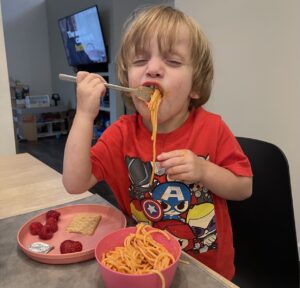Fostering a healthy relationship with food for my son with Alagille
Because of his liver disease, nutrition plays a key role in his life
Written by |

I’ve shared that nutrition plays a major role in the life of my 3-year-old son, Finley, who was born with Alagille syndrome. Because his liver has trouble processing fats, we’ve always focused on supporting his growth through nutrition. That’s why his recent desire to eat everything in sight has been such a great development. His interest in food is accompanied by a love of going to the grocery store.
Finley’s relationship with food will be important as he grows up. Eventually, my wife, Dani, and I will work with him on more difficult concepts, such as adding healthy fats to his meals. But for now, we focus on the foods he likes — which, thankfully, is an ever-growing list. He loves to eat off of my plate, is curious about new foods, and lately has had a seemingly endless appetite that we work to please.
Finding joy in food
Recently, Finley and Dani took a trip to a local co-op grocery store. From the sounds of it, he was in heaven. The store lets kids pick out a piece of fruit to eat during their shopping trip, and Finley was overjoyed about surveying his options. He identified the fruits he knew and asked questions about the ones he didn’t. He finally settled on a Cosmic Crisp apple that then accompanied him for the duration of the trip.
He’s at the age where he always wants to help — sometimes a little too much. It’s always a gamble bringing him to the store, as he’d ring up quite the bill if we let him go unchecked. Though we do have to tell him no sometimes, it’s fun to see his excitement when he gets to pick out foods he truly loves.
The items that bring him the most joy at the moment are spaghetti noodles and the accompanying red sauce, apples, “hop gummies” (his nickname for Annie’s fruit snacks), cereal boxes, and honey vanilla Greek yogurt.
He has a blast pointing out what he wants and then helping place it in the cart. Would it be easier to leave him at home? Of course. He’s 3 years old, and kids that age are the definition of a wild card. But do our grocery trips foster a positive relationship and clearer understanding of food? I think so.
There are many, many more lessons to come for Finley about his diet. At some point, we won’t have to hide that we add milk powder to his yogurt. He’ll grasp that, in addition to the red sauce on his noodles, there’s also a helping of cream cheese to boost his calorie intake. One day he’ll understand why we add a little olive oil to his jelly sandwich, instead of fighting us if he sees the oil going on.
For now, I’m thankful he’s a good eater. His older brother, Jackson, is a picky eater. I’ve written about the medical anxiety that comes from raising a child with a rare disease, and I often think about what feelings I’d experience if Finley were as picky of an eater as his brother.
That day may come. Jackson was a good eater when he was little and grew pickier with age. But I’m trying not to worry about it. Both boys get the nutrition they need, one way or another.
We’ll continue to focus on helping Finley develop a healthy relationship with food, while also introducing concepts he’ll need to employ for his health and explaining them in a way he can understand.
Note: Liver Disease News is strictly a news and information website about the disease. It does not provide medical advice, diagnosis, or treatment. This content is not intended to be a substitute for professional medical advice, diagnosis, or treatment. Always seek the advice of your physician or other qualified health provider with any questions you may have regarding a medical condition. Never disregard professional medical advice or delay in seeking it because of something you have read on this website. The opinions expressed in this column are not those of Liver Disease News or its parent company, Bionews, and are intended to spark discussion about issues pertaining to liver disease.









Leave a comment
Fill in the required fields to post. Your email address will not be published.